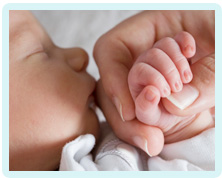
Fourth Degree Tears
Fourth degree tears during childbirth can cause significant pain both during and after childbirth, along with potentially long term complications. If this has happened to you, what treatment, if any, is available for you, and could anything have been done to prevent the tear? We understand that these questions will be running through your mind and hope that this article answers them and provides you with more useful information to help you.
 Glynns solicitors specialise purely in claims against the NHS and have helped many people to make 4th degree tear claims.
Glynns solicitors specialise purely in claims against the NHS and have helped many people to make 4th degree tear claims.
If you believe that you may have a claim against the NHS, let our team of specialist medical negligence solicitors help you today.
Please call us now on 0800 234 3300 (or from a mobile 01275 334030) or complete a Free Online Enquiry and let us explain your rights and options.
"I feel very lucky to have John representing me. I have found him to be extremely approachable, helpful and very knowledgeable, making me feel relaxed and important whilst remaining very professional."
Mrs. S.
What Is A Fourth Degree Tear?
Whilst vaginal tears can occur naturally during child birth, sometimes action could be taken by your medical team to prevent the fourth degree tear happening at all, or at least reducing the extent of it.
The tear can be caused by the size of your baby as well as other factors. 1st or 2nd second degree tears are usually more minor and have no longer term associated complications. However, both third degree tears and fourth degree tears can cause significant ongoing pain and other problems.
Whereas a third degree tear includes tearing to the vaginal tissue, perineal skin, and perineal muscles a fourth degree tear goes even deeper, tearing into the anal canal as well as into the rectum.
This can cause pain, discomfort and bleeding when visiting the toilet, but can also cause pain during sexual intercourse. If you are experiencing these problems shortly after childbirth you should immediately consult your consultant or general practitioner. Usually, however, the size and extent of the tear will be noticed by the medical staff during childbirth.
Why Does A Fourth Degree Tear Happen?
A fourth degree tear can be caused by one of a number of factors, including:
- A large baby (over approximately 9lb's)
- Your baby's shoulder becoming stuck behind your pubic bone
- A longer than average second stage of labour
- Your first vaginal birth
- An assisted birth (forceps or ventouse)
What Is The Treatment For A fourth Degree Tear?
Various treatments can be tried to heal the tear and to alleviate the pain, including:
- Repair by a surgeon (not a midwife) in a well lit theatre
- Antibiotics (which reduce the prospects of infection as the stitches to repair the tear are likely to be very close to the anus)
- Pain relief
- Pelvic floor exercises
- Laxatives
- A review after six weeks
It is important that you keep the area around the tear clean at all times.
What Is The Likely Outcome?
If early diagnosis is made and the appropriate treatment is provided, there is a good chance of a full recovery.
Is There Anything Else You Can Do?
If your medical team had clear evidence that you were highly likely to tear (for the reasons above) but failed to take action to prevent the tear, you may be entitled to make a claim for compensation for medical negligence. This is also the case if the tear is not recognised at the time of birth. To assess whether this is possible, we can offer you a free initial appraisal of your treatment, not only investigating the circumstances of the tear but also considering any other treatment that might be available for you.
Funding Your Medical Negligence Claim
We offer No Win No Fee funding for medical negligence claims which we will discuss with you during your free initial telephone discussion.
If you would like to benefit from a service of excellence with total commitment to client care from a small and friendly team, Glynns are ready and waiting to help you.
Please call us on 0800 234 3300 (or from a mobile 01275 334030) or complete our Online Enquiry Form.
"Alicia has been wonderful throughout the whole process. Her kindness and professionalism has helped me obtain a favourable outcome and her personal support has been invaluable from start to finish.
I have been updated at every stage and Alicia has always been available to answer my calls or emails.
I am so pleased I decided to use Glynns Solicitors as opposed to one of the larger advertised injury claims lawyers as I am more than confident I would not have received such a personal service by a caring and understanding solicitor.
My sincere thanks to Chris Bird for allocating my case to Alicia, I couldn't have had a better service."
Miss H.



